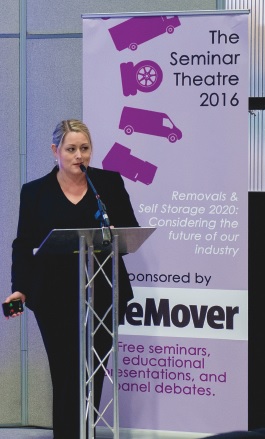Charlotte Parslow is a director of Animo Events, the company that organises The Movers and Storers Show. She has a particular expertise in handling social media complaints for her corporate customers and so, during last year’s show, she explained the best way to handle customers on social media, when things start to get a bit nasty.

Rule one, for Charlotte, is not to ignore a complaint on social media. “It will not help,” she said. “It will make your customers think that you don’t care. You must respond.”
It’s also very important to get the right person, or people, handling complaints. It might be natural to choose the person who is most social media savvy. But what you really need is the person who’s best at handling customers. “It must be someone who understands customer service, a people person, someone who is good at making people like your brand.”
In principle, handling complaints on social media is the same as any other customer service operation, but it happens much faster. “It’s customer service at terrifying break-neck speed so you have to respond quickly too. It doesn’t mean you have to completely resolve the issue immediately, especially if it happens at the weekend, but you can acknowledge the problem.”
 Charlotte said that you need to have someone available to provide that initial response around the clock, including evenings and weekends. This might require the boss to have access to social media accounts or for there to be a rota. “It’s terrifying how quickly problems escalate if they are ignored,” she said. “Give them a realistic time by which you will address the problem. For example, say ‘As soon as I am back in the office I’ll deal with this’.”
Charlotte said that you need to have someone available to provide that initial response around the clock, including evenings and weekends. This might require the boss to have access to social media accounts or for there to be a rota. “It’s terrifying how quickly problems escalate if they are ignored,” she said. “Give them a realistic time by which you will address the problem. For example, say ‘As soon as I am back in the office I’ll deal with this’.”
You should also have an escalation policy. Someone in a relatively junior position might deal with initial complaints but they need to know who they can go to if they have a problem.
If a complaint is reasonable, own up to it and tell the customer what you will do to solve the problem and prevent it from happening again. “Understand the problem and try to fix it. Don’t play the blame game.” It’s important to be genuine so don’t copy and paste stock answers. “Use their name, give them your name and make a personal connection.”
Try to help them and to understand why they went public with the complaint rather than just calling you. Did they try to contact you but you were unavailable? Keep cool. Don’t lose your temper. Don’t get defensive either. If you use humour in your response, check it out with your colleagues first and get approval from your boss. Humour can often be misunderstood.
As soon as possible take the complainant out of the public area. The longer it’s public the more it will escalate. When the customer agrees that the problem is solved, ask them to remove their original post or put up a new one saying that they have received good service from you. If they don’t, post a message yourself saying that the matter has now been resolved amicably.
“You should see a complaint as a chance to shine. Follow the procedures you already have for handling complaints, but do it quickly.” Charlotte explained that it’s how you handle a complaint that matters and, handled well, a complaint can turn into a positive experience.
Star ratings on websites tend to be somewhat misleading because people usually only make a comment if they have had an exceptionally good experience (five-star) or a very poor one (one-star). Encourage people to leave positive responses about your service, that way the occasional bad one will not have a disproportionate effect on your average rating.
There is also the phenomenon of ‘review blackmail’ that seems to be all too common. This is where people make unreasonable demands and threaten to leave a poor report if they are not met. Charlotte’s advice is not to panic. “Handle it like any other customer complaint. Try to fix the problem. Don’t be scared to say no if it’s unreasonable. Write down everything you do so you know exactly what happened if it blows up; this allows you to say ‘our recollection is different, we feel we acted reasonably’, and move on.”
Following these basic tips will help you to manage the inevitable complaints you will receive on social media more efficiently and effectively and keep your customers happy. The better you get at handling social media complaints, the fewer you will get because customers will soon learn that if they have a legitimate problem, it’s quicker and easier to pick up the phone.
www.animo-events.co.uk
www.themoversandstorersshow.co.uk
Photo: Charlotte Parslow addresses The Movers and Storers Show
Click here to see the next Editor's Pick